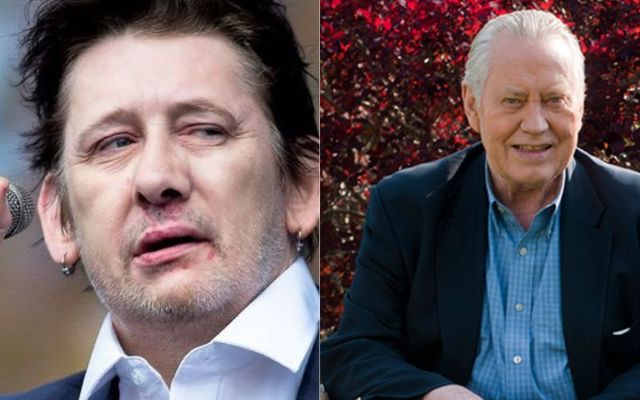This week two Irish revolutionaries were brought home to rest. One was born in New Jersey, Chuck Feeney, and the other was born in Kent, England, Shane MacGowan.
In many ways, both were polar opposites. Shane MacGowan lived in the limelight. An outspoken poet, writer, drinker, and musician. Chuck Feeney was a successful businessman, who gave everything and shunned publicity and praise.
Their funerals reflected their personalities. Following private service, Chuck’s ashes were interned in Glasnevin close to the graves of other revolutionary leaders. Shane’s requiem, a riotous celebration of a life. A procession and a céilidh in a church.
Both made a real difference in the lives of others in Ireland and further afield. They were of Ireland; but not from it. They were in the words of our proclamation, “our exiled Children”.
Chuck Feeney famously gave away his fortune to good causes. In the 1980s, war raged in the streets and fields in the North. The conflict had been ongoing for twenty years. It had developed a self-sustaining cycle of repression and resistance. A peaceful resolution was a distant dream. Into this stepped a group of influential Irish Americans.
Chuck invested in peacebuilding and deprived communities across the North. He worked to promote civil rights and political development. This was at a time of censorship. Official Ireland was castigating anyone for talking to Sinn Féin. Chuck pushed for inclusive peace talks. He would later support Sinn Féin opening offices in Washington.
A few years earlier a new wave of Irish emigrants had fled Ireland, poverty and unemployment. Many found themselves in squats in London. The conflict in Ireland had extended to the streets of Britain. The Irish faced prejudice and suspicion. Many kept their heads down. Shane MacGowan stood out.
Shane had lived the early part of his life in rural Tipperary before his family emigrated to London. He was an Irish child, schooled in England. With the swagger of youth and the energy of punk, he shouted, “I’m Irish, deal with it”. That scream was heard by a generation in Ireland and echoed in Irish Communities across the world. He articulated the emigrant experience and in the process redefined Irish music and identity.
There is a tension at the heart of the emigrant experience. In the Pogues' song, Thousands are Sailing, Phil Chevron wrote, “Where e'er we go, we celebrate. The land that makes us refugees”. For Shane, celebrated the people and culture and lambasted the political and social systems that forced emigration on generations. His was celebrated by the people and artists of Ireland.
The emigrant's hope is for Ireland, a place that can be a home to all. That vision became more defined by distance and time.
For generations, it was accepted that we raise our children for export. Looking for opportunities denied at home. A job, a home, a place to be yourself. These are not unreasonable asks of a wealthy nation.
Shane sang about the possibility of a better Ireland. Chuck Feeney sought to build it. Two unlikely allies in challenging the existing order.
The relationship between official Ireland and our diaspora is asymmetric. At its most cynical the diaspora is a network to be leveraged for contacts and contracts.
The love of our exiles for the land that made them refugees has always been stronger than the commitment of Irish Governments to our diaspora. Those who made a success in their new homes are celebrated.
The attitude of official Ireland to the diaspora is similar to their view of Irish Citizens in the north. A constant reminder of the failure of decades of governments.
In the week that interned Shane MacGowan and Chuck Feeney, the Irish Government announced that it would hold a constitutional referendum to amend the description of a woman's role in the home. A laudable referendum to remove an antiquated provision.
In 2019, following extensive consultation including a Citizens Assembly and with all party support the Irish Government agreed to hold a constitutional referendum to provide voting rights for Irish Citizens abroad and in the North of Ireland. This limited reform would grant the right to vote in Presidential elections. Similar rights are enjoyed by US citizens living in Ireland.
The constitutional referendum was never held. In 2021 and 2022, the government again committed to a referendum. We are now entering the final year of this government without a timetable for a referendum.
This referendum would give Irish citizens living abroad a voice and a political stake in the future of Ireland. It is an international best practice. It should be a right. It would appear that our citizens abroad can be seen but cannot be heard.
Shane McGowan would not be silenced. Chuck Feeney went ahead with building a new Ireland. Neither took no for an answer. Both will be missed. Their contributions to Ireland will be celebrated for generations to come.
I am lucky to know and work with many in the US and Canada who are equally committed to building a new Ireland. The diaspora must have a voice in that process.
Our greatest tribute to them and the generations who were forced into emigration to avoid persecution, poverty, or hunger, is to build an Ireland of opportunity, prosperity, and peace.




Comments